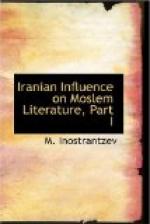[Sidenote: The careless Jeweller.]
A merchant had many precious stones. To bore a hole through them he hired a man for a hundred pieces of gold a day and went with him to his house. As soon however, as he set to work, there was a lute and the workman turned his eyes towards it. And upon the merchant questioning him whether he could play upon it he replied, “Yes, right well.” For he was indeed proficient in the art. “Then take it” said the merchant. He therefore took it and played for the merchant the whole day beautiful melodies in proper tune so that the jeweller left the caset with the precious stones in it and filled with joy kept time, nodding his head and waving his hand. In the evening he said to the jeweller, “Let me have my wages,” And when the latter said, “Have you done anything to deserve the wage?” he replied, “You have hired me and I have done what you ordered me to do.” So he pressed him till he received his hundred pieces without any deduction, while the gems remained unbored.
[Sidenote: Aversion to pleasures of the world: Buddhistic pessimism.]
The more I reflected upon the world and its joys the deeper grew my aversion towards them. Then I made up my mind entirely to devote myself to the life of the blessed and the anchorite. For I saw that asceticism is a garden the hedge of which keeps off at a distance eternal evils, and the door through which man attains to everlasting felicity. And I found that a divine tranquility comes over the ascetic when he is absorbed in meditation; for he is still, contented, unambitious, satisfied, free from cares, has renounced the world, has escaped from evils, is devoid of greed, is pure, independent, protected against sorrow, above jealousy, manifests pure love, has abandoned all that is transitory, has acquired perfect understanding, has seen the recompense of the next world, is secure against remorse, fears no man, does none any harm and remains himself unmolested. And the more I pondered over asceticism the more I yearned for it so that at last I earnestly thought of becoming an ascetic.
[Sidenote: The trials of an anchorite: the greedy dog.]




